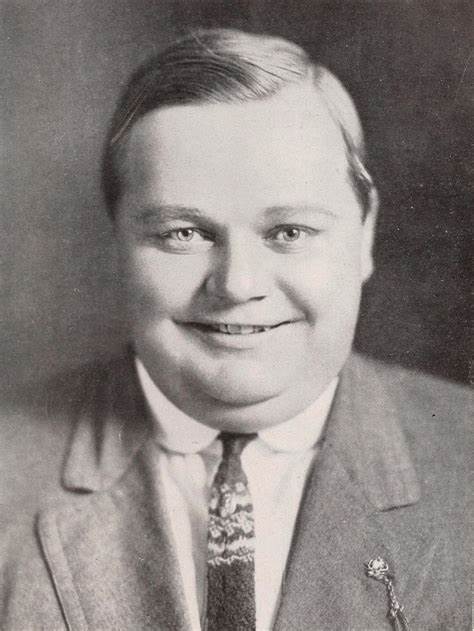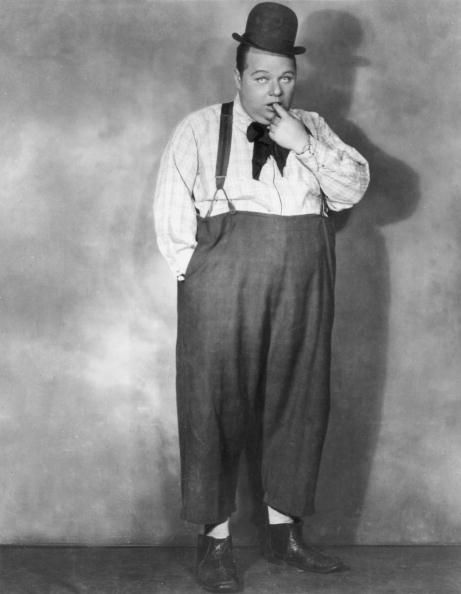By all accounts he was a kind, generous and gentle man.
Roscoe Conkling Arbuckle was born in Kansas in March, 1887, to a drunken father who refused to believe that the baby was his and so named him after a politician he hated. Emotionally and physically rejected and eventually abandoned by his father, he had even blamed the boy for the health problems which resulted in his mother’s death when young Roscoe was 12 years old. Bullied and taunted by other children who called him “fatty”, he was shy and tongue-tied and found comfort in food.
As a teenager, he supported himself by doing odd jobs at a hotel in San Jose, CA. One day, while singing as he worked, he was overheard by a professional singer who suggested that he sign up for the amateur night contest at a local theater. In addition to singing on the stage, he also performed a variety of jigs, somersaults and pratfalls in an effort to avoid the hook used to pull performers off stage. The audience loved it and he found that his self-consciousness disappeared while he was performing. Vaudeville was the next step. In 1909, after several years on the vaudeville circuit, he began his film career in one-reel comedies for the Selig Company. By 1913, Arbuckle was starring in Mack Sennett’s Keystone Kops comedies. He had already become so popular that the following year Paramount Pictures offered him $1,000 per day, 25% of all profits and complete artistic control to make movies for them. Five years later, Roscoe “Fatty” Arbuckle was the first performer to be offered a million-dollar annual salary by a Hollywood studio.

Arbuckle possessed a beautiful tenor voice and, upon hearing him sing, opera great Enrico Caruso urged him to give upmovies and become “the second greatest opera singer in the world”. Arbuckle generously mentored young performers such as Charlie Chaplin, who based his tramp character on Arbuckle’s screen image. He gave Buster Keaton his first film roles, and advised a young vaudeville performer, Bob Hope, to go to Hollywood, giving him the names and phone numbers of people to contact.

In 1921, Arbuckle, who was separated from his wife at the time, and two friends drove to San Francisco to take a break from their hectic schedule. While there, they threw a party, inviting several women. One of them, 30-year-old Virginia Rappe became seriously ill and was examined by the hotel doctor, who declared her simply drunk. When Rappe died of peritonitis three days later, one of the other women, Maude Delmont, accused Arbuckle of rupturing Rappe’s bladder while raping her. San Francisco District Attorney, Matthew Brady, planning to be the next Governor of California, figured that convicting Arbuckle of rape would help his political ambitions. Despite no evidence that a rape had taken place, accuser Maude Delmont’s long criminal record, and even her letter admitting that she had planned to extort Arbuckle for money, the
judge allowed Brady to change the charge against Arbuckle from rape to manslaughter. In the first of three trials, the jury deadlocked, and a mistrial was declared. During the second trial, one prosecution witness testified that District Attorney Brady had forced her to lie, while a second prosecution witness turned out to be an escaped prisoner and a fingerprint expert testified that the fingerprint evidence was fake. Despite that, when Arbuckle didn’t testify some jurors assumed he was guilty and another deadlocked jury resulted. By the time the third trial began, his films had been banned by the censorship board and William Randolph Hearst’s newspapers had been proclaiming Arbuckle’s guilt for seven months. This time, the jury took only six minutes to declare him not guilty. But, by then, his film career was gone.

His name was now poison in the film industry. He began drinking heavily, finding comfort in a bottle, as he had in food. His friend, Buster Keaton, extended help by giving him work writing and directing. Before long he was directing comedy shorts under the pseudonym Willian Goodrich (his father’s first and

middle names), for lesser known studios, starring unknown actors. Finally, in 1931, he signed a contract with Jack Warner to star in six two-reel short comedies under his own name. The six shorts, filmed in Brooklyn, co-starred Lionel Stander and Shemp Howard, of the Three Stooges. They contain the only known recordings of Arbuckle’s voice. The day after he finished filming the last of the two-reelers, he was signed by Warner Brothers to make a full-length feature film. His reputation had been restored. That night he told his wife “this is the best day of my life”. Several hours later, he was dead of an apparent heart attack. Roscoe “Fatty” Arbuckle was just 46 years old.
Next week, another story from Silver Screen Memories.



Like it
LikeLike